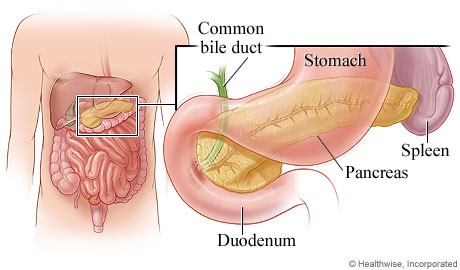What does your pancreas do?
Your pancreas is an organ located below your stomach. It is attached to your small bowel. The pancreas has 2 main jobs:
- To make the right amount of insulin to keep your blood glucose (sugar) levels under control and to change sugar into energy for your body. If you have type 1 diabetes, islet cells in your pancreas don’t make the right amount of insulin or don’t make any insulin at all.
- To make enzymes (fluids) to help digest the food you eat.
Over time, high blood glucose levels can affect your eyesight, nervous system, blood vessels, heart, and kidneys.

Who can get a pancreas transplant?
There are 3 types of pancreas transplant. They are offered to different people depending on their individual situation.
A
pancreas alone transplant means that the pancreas is the only organ that is transplanted. It may be offered to people who:
- have type 1 diabetes (type 2 may be considered) and need insulin
- have blood glucose levels that are not stable and are outside of the target range
- often have low blood glucose levels without warning
A
pancreas after kidney transplant means that the pancreas is transplanted after you’ve had a
kidney transplant. It may be offered to people who:
- have had a kidney transplant, and whose kidney function is good
- have type 1 diabetes (type 2 may be considered) and need insulin
- have blood glucose levels that are not stable and are outside of the target range
- often have low blood glucose levels without warning
A
combined kidney and pancreas transplant means that you get a
kidney transplant and a pancreas transplant at the same time. It may be offered to people who have poor kidney function and:
- have type 1 diabetes (type 2 may be considered) and need insulin
- have blood glucose levels that are not stable and are outside of the target range
- often have low blood glucose levels without warning
What other transplant options can help control blood glucose levels?
Islet cell transplants, where only the islet cells from the pancreas are transplanted, may be an option. In most cases, you may need more than one islet cell transplant.
Talk to your transplant team to see if an islet transplant is an option for you.
Is a pancreas transplant right for me?
A successful pancreas transplant allows people with diabetes to decrease their need for insulin. It may also decrease their risk for both high and low blood glucose levels.
A pancreas transplant is not suitable for everyone, and it is also not a cure. With a transplant, you are exchanging sick organs for healthy ones, with the hope of living longer and having a better quality of life. It is important to know that getting a transplant involves a lifetime commitment to medical treatment, like taking daily medicines, going to clinic appointments, and doing regular bloodwork and other tests.
A transplant is offered only when all other treatment options have been tried.
If you have or have had a serious disease or certain types of cancer, you may not be eligible for a transplant. Your transplant team will review your medical history to see if a transplant is an option for you.
If you smoke tobacco or cannabis, you may need to stop before you are able to go onto the waitlist for a pancreas transplant. Smoking increases the risk of a blood clot forming, which would cause the transplanted pancreas not to work.
Anyone with a history of drug or alcohol use may need to be assessed by an addictions counselling team. Support is available. Your transplant team can help connect you to counselling and other services. If you do not use the counselling and follow-up services for substance use that the transplant program recommends, you may not be eligible for the transplant.
Where are pancreas transplants done in Alberta?
Pancreas transplants are done in Edmonton at the University of Alberta Hospital and in Calgary at Foothills Medical Centre.
